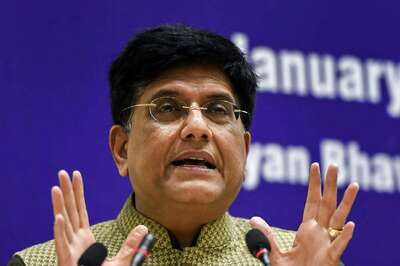
views
Last evening, I came across an ingeniously authored article by someone I venerate for his scholarship. Titled ‘If Uniform Civil Code Means Hindus Losing Benefits Like Hindu Undivided Family, So Be It’, the arguments proffered were acceptable, coherent, and didn’t fall flat on logic, except that Hindus may have to lose benefits for bringing in the Uniform Civil Code. Indeed, Hindus have consistently bequeathed what is rightfully theirs, from the Partition of Bengal in 1905 to the vivisection of the nation in 1947 – just to pamper the purported “younger brother”. For a country promulgating and professing minority-ism or Nehruvian secularism for nearly seven decades, the Uniform Civil Code or UCC should be nothing short of a zenith for the Nehruvian secularists. They should embrace it with open arms.
The Muslim community, by and large and almost invariably, seems hostile to the idea of a civil code and wishes to preserve its own separate personal law. When considering the virtues and pretext of Muslim law with regard to Muslim women, the reality is harsh and a horrendous compromise. While a Muslim woman must practice monogamy, her husband is allowed to have up to four wives at a time. He has the right to dissolve the marriage at any time. The wife, on the other hand, can only divorce with the approval of her husband.
She is also ineligible to be the legal guardian of her underage child. Under Islamic law, the share of a male heir is twice that of a female heir. Other troubling components of the law include Nikah halala, and no maintenance for a divorced woman beyond the Iddat period. For Muslim women, the question of gender equity in the family has been forever entwined in a complex web of conservatism, patriarchy and politics. Thus, these Islamic heteropatriarchal laws are not only a serious violation of equality and social justice for practising Muslim women, but also unsuspecting women from other faiths who are often lured into ‘love jihad’.
Many women in India are living in deplorable situations merely because non-Hindu faiths’ personal rules have not been subjected to modern social changes. On the contrary, efforts are made to deny them even the rights and advantages that the Constitution liberally offers them in the guise of religious freedom. Allowing things to continue as they are would mean that more and more provisions of such personal laws would have to be tested in the court to see how well they adhere to the Constitution.
Religious leaders frequently claim that Islam granted women’s rights 1,400 years ago, but refuse to say whether or not these rights are oppressive when viewed objectively. As a result, seven decades after Independence, reform in Muslim family law has remained elusive. The Shariat Application Act of 1937 governs Indian Muslims, but it contains no safeguards regarding marriage age, divorce, polygamy, child custody and guardianship, women’s stake in property, and so on. As a result, practises such as child marriage, triple talaq, halala, polygamy and denial of a portion of property to women have persisted, in defiance of constitutional standards and in accordance with Quranic gender bias doctrines.
Similarly, Christian marriage, divorce, maintenance and succession rules appear to be outdated, severe and discriminatory against women. Section 10A(1) of the Christian Divorce Law, for example, mandates a two-year separation period for any spouse seeking a consensual divorce. Under the 1925 Succession Act, Christian mothers have no claim to the property of their deceased children. The father will inherit the property.
On the contrary, Hindutva is a living culture that got mired in malpractices after the advent of foreign and Abrahamic religions like Islam and Christianity. Casteism, superstitions, Sati, child marriage and other social evils beset Hindu society in the first part of the nineteenth century. Though rooted in reactions to the barbaric nature of these Semitic cults, with no historical significance or mention in the Vedic literature, these malpractices were projected onto Hindus as if they were an intrinsic part of them. The pressing need for social reform became apparent in the early decades of the nineteenth century. There were social and religious reform movements among Hindus that aimed for abolition of caste system, untouchability, Sati, child marriage, socio-economic disparities and illiteracy. Over the course of time, the self-evolving and dynamically conscious Hindu society got rid of such malpractices at the behest of its followers’ collective spiritual longing for justice, but that isn’t the case with other religions that coexist in modern India.
One should also know that post-Independence, Hindu Code Bills – which included the Hindu Marriage Act of 1955, the Hindu Succession Act of 1956, the Hindu Minority and Guardianship Act of 1956, and the Hindu Adoptions and Maintenance Act of 1956 – reformed the Hindu personal laws. These rules were not only a codification of Hindu law, but also a rejection of many Hindu practices and traditions. Muslims, on the other hand, have remained controlled by Muslim personal law, which is heavily influenced by the opinions of Muslim community leaders. The purported intention behind the initial attempt to revise and codify Hindu Law was that if it succeeded, other communities would follow suit, but this did not happen.
Here, it is worth mentioning Dr B.R. Ambedkar who once remarked, “… Rights are protected not by law, but by the social and moral conscience of society. If social conscience is such that it is prepared to recognise the rights that the law proposes to enact, rights will be safe and secure. But if the fundamental rights are opposed by the community, no law, no Parliament, no Judiciary can guarantee them in the real sense of the word.” These words are equally relevant today, for they reflect the psyche of Muslim leaders and clerics who must now come out in support of this initiative. They must understand that in 21st century, they can’t pretend to live in a seventh-century culture.
A Bill on UCC should not be opposed just for the sake of opposition. From Partition in 1947 to Hijab in 2022, Muslims in the country have run roughshod the concept of “Sarva Panth Sambhav” all the while claiming victimisation. While we discuss the Uniform Civil Code, India will be dealing with a much bigger problem. It is time for the Muslim community to conflate their religious identity with the identity of being Indians first, thus demonstrating their true faith in the Constitution as its true believers. In fact, UCC should prove to be the ultimate test for the said minorities, and not for the majority of Hindus.
Hindus have given away most of their rights and even land. The reality is that Hindus have no benefits under the current constitutional provisions. In the name of letting go of so-called benefits to Hindus, more jargon will be introduced in the form of legal paradoxes that will further damage the leftover rights of Hindus. UCC is indeed a great step towards undoing the socio-political rhetoric that has led to persecution of non-Hindu women, but it should not be at the cost of Hindu rights. This time Hindus won’t cower down or get ensconced in bhaichara.
Yuvraj Pokharna is a Surat-based educator, columnist, and social activist. The views expressed in this article are those of the author and do not represent the stand of this publication.
Read all the Latest Opinion News and Breaking News here




















Comments
0 comment